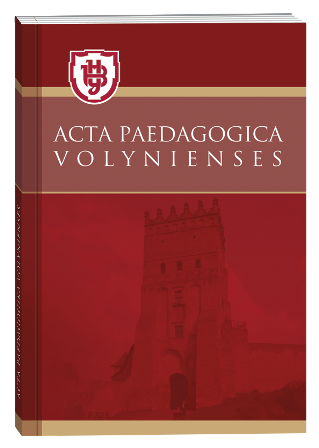ВИЯВЛЕННЯ ПЕДАГОГІЧНИХ УМОВ ФОРМУВАННЯ КОМПЕТЕНТНОСТІ СПІЛКУВАННЯ ІНОЗЕМНОЮ МОВОЮ
DOI:
https://doi.org/10.32782/apv/2023.5.9Ключові слова:
компетентність спілкування, інформаційно-цифрова компетентність, інформація, мотиваціяАнотація
Сприймання передбачає відображення у свідомості людини предметів і явищ навколишнього світу та їх взаємозв’язків, які можуть бути запропоновані у природній для себе формі, у вербальному викладі, з допомогою ілюстрування тощо і відповідно передбачати участь різних органів сприймання з боку того, хто навчається, – слухових, зорових тощо рецепторів. Наприклад, викладач у практиці навчання спілкування використовував міні-текст з малюнками-опорами. Крім того, ще одним приймання у навчанні іноземній мові було читання коротких оповідань та коміксів, адже пригоди героїв історій у коміксах мотивуватимуть слухача до читання реплік персонажів, спонукатимуть його відтворювати репліки не тільки з правильною вимовою, але із відповідним інтонаційним оформленням. Цьому сприяло використання якісного аудіосупроводу, що впливав на розвиток фонематичного слуху та інтонаційно-вимовних навичок під час читання по ролях чи під час драматизації за зразком. Другою педагогічною умовою ми розглянули формування компетентності викладачів щодо використання новітніх технологій в освітньому процесі з метою розвитку компетентності спілкування іноземною мовою. Третьою педагогічною умовою є розвиток позитивної мотивації до спілкування іноземними мовами. Визначальним компонентом організації навчальної діяльності є мотивація. Будь-яка діяльність людини завжди зумовлена мотивом. Багато дослідників вважають, що мотивація навчальної діяльності існує як окремий вид мотивації. Під мотивацією до дистанційного навчання розуміємо пізнавальні інтереси, мотиви, пізнавальні потреби як усвідомлені спонуки навчання. Важливість інформаційно-цифрової компетентності окреслено у Концепції нової української школи. Вона передбачає впевнене, а водночас критичне застосування інформаційно-комунікаційних технологій для створення, пошуку, оброблення, обміну інформацією на роботі, у публічному просторі та приватному спілкуванні, інформаційну і медіаграмотність, основи програмування, алгоритмічне мислення, роботу з базами даних, навички безпеки в Internet та кібербезпеці, розуміння етики роботи з інформацією (авторське право, інтелектуальна власність тощо). Розвиток компетентності спілкування іноземною мовою у здобувачів вищої освіти забезпечує їхній неперервний професійний розвиток з опанування цифрових технологій та інформаційної культури освітнього процесу для успішного вивчення іноземної мови.
Посилання
Арістова Н. О. Формування мотивації вивчення іноземної мови у студентів вищих навчальних закладів : монографія. К. : ТОВ «ГЛІФМЕДІЯ», 2015. 240 с.
Бернвальдт Т. Формування мотивації навчальної діяльності майбутніх учителів в умовах сьогодення. Рідна школа. 2011. № 11. С. 60–63. URL: http://nbuv.gov.ua/UJRN/rsh_2011_11_17 (дата звернення 14.12.2022).
Вишневський О. І. Теоретичні основи сучасної української педагогіки. Вид. 3-тє, доопрац., допов. Київ, Знання, 2008. 568 с.
Лукьяненко Д. В. Рекомендації щодо організації освітнього процесу в закладах загальної середньої освіти із застосуванням технологій дистанційного навчання для вчителів української мови і літератури. Організація освітнього процесу із застосуванням технологій дистанційного навчання у 2020/2021 навчальному році : метод. рек. / за заг. ред. В. І. Шуляра. ОІППО, 2020. С. 31.
Лютий В. М. Теоретичне обґрунтування сутності, значення і особливостей мовної компетентності офіцерів військових частин Національної гвардії України. Вісник Луганського національного університету імені Тараса Шевченка. Педагогічні науки. 2020. № 5(336). С. 35–51.
Маслак Л. П. Педагогічні умови формування культурологічної компетентності майбутніх офіцерів радіоінженерних спеціальностей : автореф. дис. … канд. пед. наук : 13.00.04 / Житомирський державний університет імені Івана Франка. Житомир, 2010. 20 с.
Моторнюк Т. М. Інформаційно-комунікаційні технології у контексті навчання англійській мові студентів ВНЗ. Сучасні підходи до навчання іноземної мови: шляхи інтеграції школи та ВНЗ : матеріали IIІ Міжнародної конференції, м. Харків, 12 квітня 2013 р. С. 115. URL:https://www.univer.kharkov.ua/images/redactor/news/2013-04-15/abstracts_conf_2013_april.pdf (дата звернення 14.12.2022).
Основи організації дистанційного навчання у системі неперервної освіти : метод. рек. / уклад. О. П. Муковіз. Умань : Жовтий О. О., 2016. 66 с.







